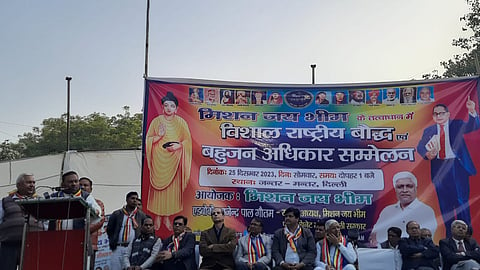
New Delhi- Despite decades of Independence, the rights of Dalit and Bahujan individuals remain unfulfilled. A growing sense of disillusionment with the ruling party and a heightened demand for equality have led Dalit and Bahujan representatives to converge at Jantar Mantar. The discussions at the gathering spanned a wide range of issues, from advocating for equality to commemorating Baba Saheb Ambedkar. As the speeches unfolded, they inevitably transitioned into political discourse, particularly focusing on topics such as Electronic Voting Machines (EVMs) and criticisms of the ruling party.
Mission Jai Bhim organized ‘Rashtriya Boudh and Bahujan Adhikar Sammelan’ at Jantar Mantar on 25th December, 12:00 PM onwards. Many prominent figures came to lend their solidarity with the Dalit and Bahujan voices present in the audience.
25th December is celebrated as Manusmriti Dahen Diwas as well, the day when Babasaheb burned the controversial religious text by the name ‘Manusmriti’ which viciously attacks marginalised communities and genders just for existing while upholding Brahmanical patriarchy. Former minister Rajendra Pal Gautam who is also the national president of Mission Jai Bhim expressed “Babasaheb burned the Manusmriti and gave rise to a new society. So, I feel, this day from now on should be celebrated both as ‘Manusmriti Dahen Diwas’ and ‘Sanskriti Parivartan Diwas’ as the act changed the course of the society.
Professor Ratan Lal Singh took the dias to speak about rights of the marginalised communities and the current degradation. Asking people to implore, the professor said “OBCs got their rights in early 90s but SCs/STs have been provided reservation before the independence of the nation, according to the Poona Pact, yet the fight is still going on. We cannot sit and wait to form the government anymore. Politics does not only mean fighting elections but asking questions and starting discussions as well. Just like politics, educational institutions are important too, whose quality is also going down.”
Mohammad Pracha, a Supreme Court Advocate remarked, “Ambedkarites never speak outside the lines of constitution while Manuwadis can never stay within the lines. Constitution, Law and peace are a part of our souls, the ones provided to us by Babasaheb Ambedkar.” Talking about his work with the Muslim community, he added, “I worked with Muslim Mahapnachayat too. During that time, I was told if I only talk about issues faced by the Muslim community, I will get a primetime slot. But if I bring in issues of Dalits and Adivasis, I will not get the same opportunities. This is government’s way of pitting communities against each other while using Muslim people as the fulcrum for violence.”
Swami Prasad Maurya, member of Uttar Pradesh Legislative Council and a leader of Samajwadi Party expressed his disappointment with the ruling party, stating that unemployment is still in rise. Talking about the latest security breach at parliament, the leader said, “the security concern with parliament was due to the increased apathy towards the government and the hunger for food which led the youngsters take the risk.”
Apart from minority rights, discussion on distrust of the EVM voting system was also a major focus at the sit-in. Supreme Court Advocate Bhanu Pratap Singh reiterated the need to protest for ballot-paper voting, raising concerns regarding the easy hacking of the already available system. He further declared, “I would like to ask everyone to join us again on 6th January, when we protest at the very same site against EVM system.”
The General conference aims to unanimously approve proposals on the following subjects:
Implementation of the separate constituency system endorsed in the Round Table Conference proposed by Babasaheb Dr. Bhimrao Ambedkar.
Assurance of the participation and involvement of Scheduled Castes, Tribes, Backward Classes, and Minority Classes in all types of resources and work-force in the country.
Celebrating the longevity of the Indian Constitution and paying tribute to Tathagat Buddha and Savitribai Phule.
Advocating for the abolition of the contractual system.
Ensuring equal access to high-level free education and health services for all, as well as guaranteeing employment opportunities for everyone.
Distribution of agricultural land to landless farmers.
Proposing reservation for Scheduled Castes/Tribes and Backward Classes in government contracts based on their population.
Advocating for reservation in the higher judiciary and army.
Demanding the imposition of the death penalty for mob violence based on caste and religion.
Urging the immediate cessation of the contracting system.
Also Read-
You can also join our WhatsApp group to get premium and selected news of The Mooknayak on WhatsApp. Click here to join the WhatsApp group.